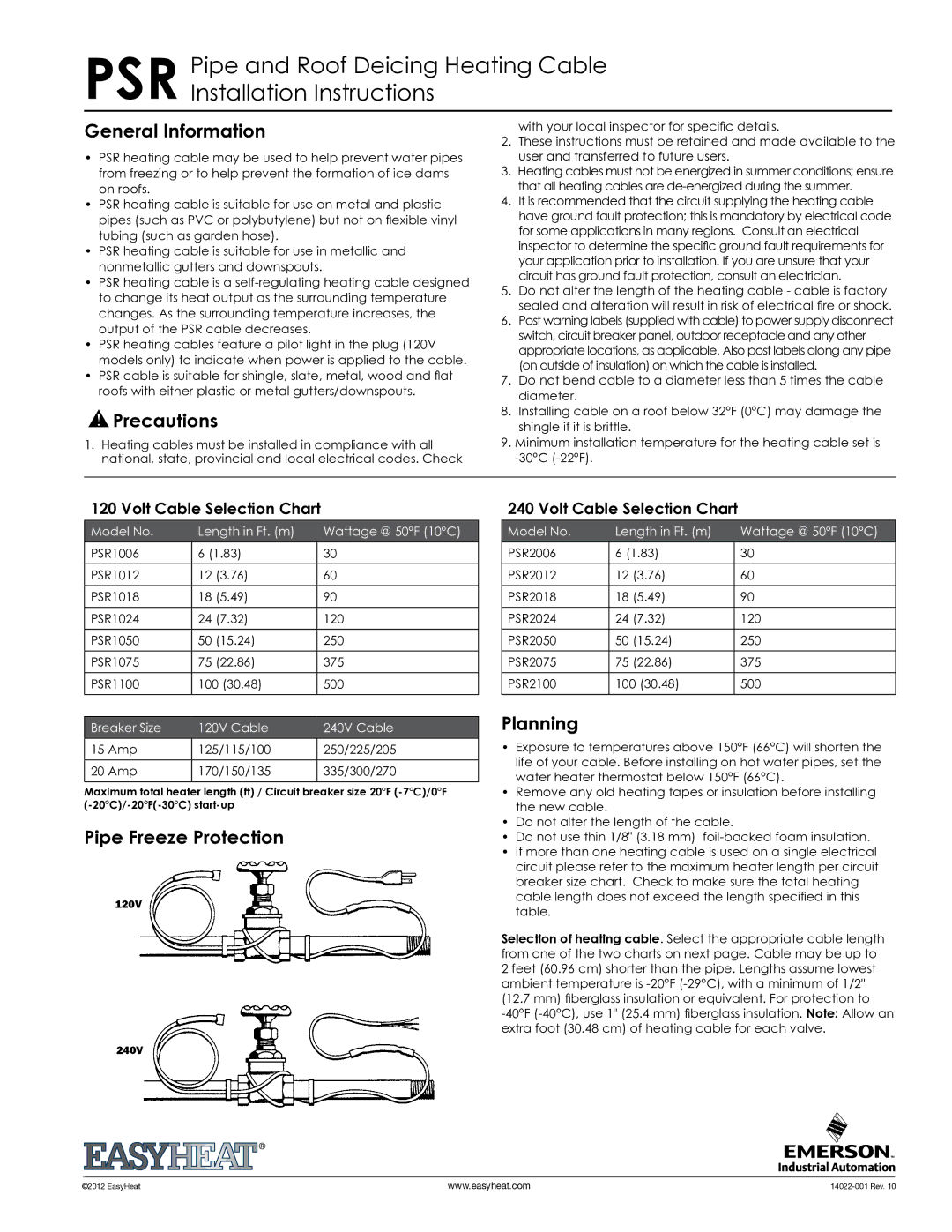
PSR Pipe and Roof Deicing Heating Cable Installation Instructions
General Information
•PSR heating cable may be used to help prevent water pipes from freezing or to help prevent the formation of ice dams on roofs.
•PSR heating cable is suitable for use on metal and plastic pipes (such as PVC or polybutylene) but not on flexible vinyl tubing (such as garden hose).
•PSR heating cable is suitable for use in metallic and nonmetallic gutters and downspouts.
•PSR heating cable is a
•PSR heating cables feature a pilot light in the plug (120V models only) to indicate when power is applied to the cable.
•PSR cable is suitable for shingle, slate, metal, wood and flat roofs with either plastic or metal gutters/downspouts.
 Precautions
Precautions
1.Heating cables must be installed in compliance with all national, state, provincial and local electrical codes. Check
with your local inspector for specific details.
2.These instructions must be retained and made available to the user and transferred to future users.
3.Heating cables must not be energized in summer conditions; ensure that all heating cables are
4.It is recommended that the circuit supplying the heating cable have ground fault protection; this is mandatory by electrical code for some applications in many regions. Consult an electrical inspector to determine the specific ground fault requirements for your application prior to installation. If you are unsure that your circuit has ground fault protection, consult an electrician.
5.Do not alter the length of the heating cable- cable is factory sealed and alteration will result in risk of electrical fire or shock.
6.Post warning labels (supplied with cable) to power supply disconnect switch, circuit breaker panel, outdoor receptacle and any other appropriate locations, as applicable. Also post labels along any pipe (on outside of insulation) on which the cable is installed.
7.Do not bend cable to a diameter less than 5 times the cable diameter.
8.Installing cable on a roof below 32°F (0°C) may damage the shingle if it is brittle.
9.Minimum installation temperature for the heating cable set is
120 Volt Cable Selection Chart
Model No. | Length in Ft. (m) | Wattage @ 50°F (10°C) | |
|
|
| |
PSR1006 | 6 (1.83) | 30 | |
|
|
|
|
PSR1012 | 12 | (3.76) | 60 |
|
|
|
|
PSR1018 | 18 | (5.49) | 90 |
|
|
|
|
PSR1024 | 24 | (7.32) | 120 |
|
|
|
|
PSR1050 | 50 | (15.24) | 250 |
|
|
|
|
PSR1075 | 75 | (22.86) | 375 |
|
|
| |
PSR1100 | 100 (30.48) | 500 | |
|
|
| |
|
|
| |
Breaker Size | 120V Cable | 240V Cable | |
15 Amp | 125/115/100 | 250/225/205 | |
|
|
| |
20 Amp | 170/150/135 | 335/300/270 | |
|
|
|
|
Maximum total heater length (ft) / Circuit breaker size 20°F
Pipe Freeze Protection
120V
240V
240 Volt Cable Selection Chart
Model No. | Length in Ft. (m) | Wattage @ 50°F (10°C) | |
|
|
| |
PSR2006 | 6 (1.83) | 30 | |
|
|
|
|
PSR2012 | 12 | (3.76) | 60 |
|
|
|
|
PSR2018 | 18 | (5.49) | 90 |
|
|
|
|
PSR2024 | 24 | (7.32) | 120 |
|
|
|
|
PSR2050 | 50 | (15.24) | 250 |
|
|
|
|
PSR2075 | 75 | (22.86) | 375 |
|
|
| |
PSR2100 | 100 (30.48) | 500 | |
|
|
|
|
Planning
•Exposure to temperatures above 150°F (66°C) will shorten the life of your cable. Before installing on hot water pipes, set the water heater thermostat below 150°F (66°C).
•Remove any old heating tapes or insulation before installing the new cable.
•Do not alter the length of the cable.
•Do not use thin 1/8" (3.18 mm)
•If more than one heating cable is used on a single electrical circuit please refer to the maximum heater length per circuit breaker size chart. Check to make sure the total heating cable length does not exceed the length specified in this table.
Selection of heating cable. Select the appropriate cable length from one of the two charts on next page. Cable may be up to 2 feet (60.96 cm) shorter than the pipe. Lengths assume lowest ambient temperature is
©2012 EasyHeat | www.easyheat.com |
